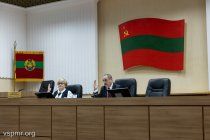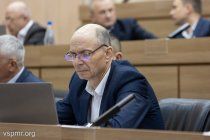 Русский
Русский English
English-







The parole conditions are being adjusted
A convicted person can be released early according to the Criminal Code in Pridnestrovie, if the court recognizes that he does not need to serve the full sentence for his correction. This is prescribed by Article 78 of the Criminal Code of the PMR (Parole and early release from serving a sentence). This article proposes to include an additional condition: the convicted person must meet the criteria for correction and compensate fully or partially for the damage caused by the crime in the amount determined by the court decision. Amendments to the Criminal Code and several relevant laws were proposed by the PMR Prosecutor Anatoly Guretsky and the Chairman of the Legislation Committee, Vice-Speaker Galina Antyufeeva. Deputies of the Supreme Council considered the legislations in the first reading in the course of the plenary session.
The proposed legislations were prepared on behalf of the President of the Pridnestrovian Moldavian Republic Vadim Krasnoselsky to the Supreme Council, the Prosecutor of the Pridnestrovian Moldavian Republic, and the Ministry of Justice to enhance the work of the institution of parole. The authors proposed to prescribe in the Criminal Code criteria for the application of parole for convicted pregnant women and women with children under 3 years of age. Parole can be applied for them only after the actual service of at least one quarter of the sentence imposed for a crime of minor gravity.
It is stated that the court takes into account his behavior, attitude to study and work during the entire period of serving his sentence, including available incentives and penalties, when considering a convicted person’s request for parole. Partial or full compensation for damage caused or otherwise compensation for harm caused as a result of the crime is taken into account. It is expected that the court will take into account the conclusion of the correctional institution administration on the advisability of parole and the convicts’ compliance with the correction criteria. The court will take into account his attitude towards treatment and the results of treatment if a convicted person is prescribed compulsory treatment for alcoholism, drug addiction and substance abuse.
It was emphasized in the course of the plenary session: parole does not mean complete release, but a change in the measure of detention. Parole involves a probationary period during which a person must prove his correction. If the terms of the probation period are violated, the person’s punishment is reinstated.
The changes proposed by the authors are being introduced to the Criminal, Criminal Executive and Criminal Procedure Codes and to the law “On institutions and bodies executing criminal penalties in the form of imprisonment”.
The specialized parliamentary committee on legislation and protection of the rights and freedoms of citizens will continue to work on the legislations. The draft laws are scheduled to be considered in the second final reading at the next plenary meeting.




